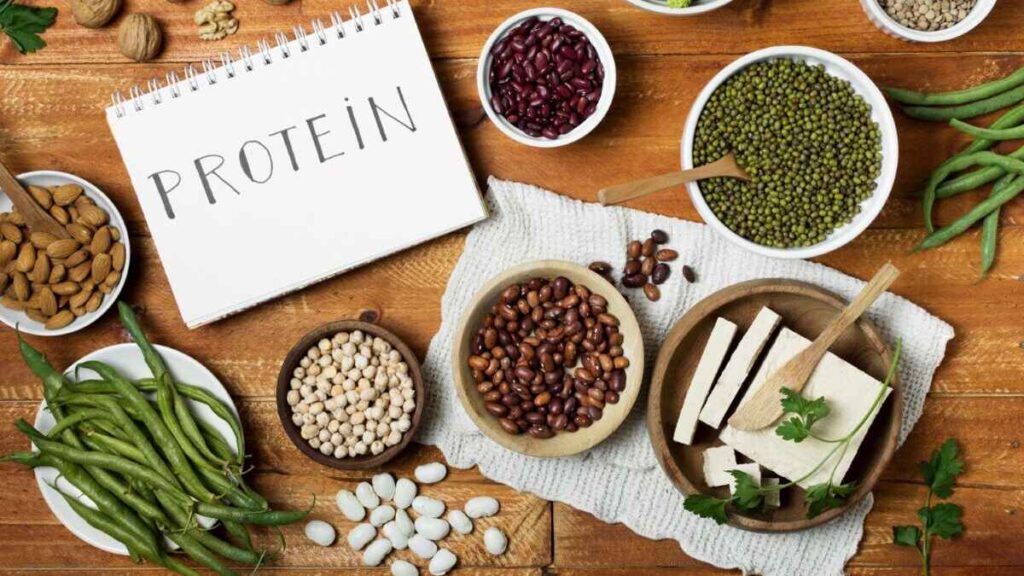Introduction
The world is changing rapidly, and so are our eating habits. Vegan protein has skyrocketed in popularity recently, shaking up the food industry. More people are choosing plant-based diets, not just for ethical reasons but for health and sustainability, too. But is vegan protein truly the future?
- Introduction
- What is Vegan Protein?
- Market Growth of Vegan Protein
- Health Benefits of Vegan Protein
- Environmental Impact of Vegan Protein
- The Role of Technology in Vegan Protein Production
- Consumer Trends Shaping the Vegan Protein Market
- Challenges Facing the Vegan Protein Industry
- Major Players in the Vegan Protein Market
- Vegan Protein in the Food Industry
- The Future of Vegan Protein
- How to Incorporate Vegan Protein into Your Diet
- Myths and Misconceptions About Vegan Protein
- Comparing Vegan Protein with Traditional Protein Sources
- Conclusion
Consumers are turning away from traditional animal-based protein sources with increasing awareness about climate change, animal welfare, and personal health. Instead, they embrace vegan protein as a more sustainable and nutritious alternative.
The demand for plant-based protein is booming, from athletes looking for high-performance fuel to individuals seeking cleaner, cruelty-free nutrition. In this article, we’ll explore the major market trends, the benefits of vegan protein, and whether it’s here to stay or just another food trend.
What is Vegan Protein?
Simply put, vegan protein is protein sourced from plants rather than animals. It comes from various plant-based sources, including legumes, grains, nuts, and seeds. Some of the most popular types include:
- Pea Protein – Rich in essential amino acids, excellent for muscle building.
- Soy Protein – One of the most complete plant-based proteins.
- Rice Protein – Hypoallergenic and easy to digest.
- Hemp Protein – Packed with omega-3s and fiber.
- Pumpkin Seed Protein: Rich in zinc and magnesium.
Unlike animal-based proteins, vegan protein is cholesterol-free and often contains more fiber and antioxidants. While some believe plant proteins lack essential amino acids, combining different plant sources can provide a complete protein profile.
Market Growth of Vegan Protein
The market for vegan protein is expanding at an unprecedented rate. In 2020 the global plant-based protein market was valued at around $10 billion. By 2025, it is projected to exceed $18 billion, driven by:
- A growing number of vegans and vegetarians
- Concerns about environmental sustainability
- Increased prevalence of lactose intolerance and dairy allergies
- The rise of flexitarian diets, where people reduce animal products without eliminating them completely
Major food companies and startups are investing heavily in vegan protein, signaling that plant-based nutrition is more than a fad.
Health Benefits of Vegan Protein
Many assume that vegan protein is inferior to animal-based protein, but research suggests otherwise. Here are some key health benefits:
- Muscle Growth & Recovery – Contrary to popular belief, plant proteins can support muscle development as effectively as whey protein, especially when combined (e.g., pea + rice protein).
- Heart Health – Plant-based proteins are free from cholesterol and lower in saturated fats, reducing the risk of heart disease.
- Better Digestion – High fiber content in vegan protein helps maintain gut health and prevents digestive issues.
- Lower Risk of Chronic Diseases – Studies suggest that diets rich in plant-based proteins can reduce the risk of diabetes, obesity, and hypertension.
As science continues exploring the benefits of vegan protein, more people recognize its potential as a healthier, more sustainable alternative to traditional protein sources.
Environmental Impact of Vegan Protein
One of the biggest drivers behind the shift to vegan protein is its environmental benefits. Compared to animal protein, plant-based proteins require significantly fewer resources:
- Less Water Consumption – Producing 1 kg of plant protein uses up to 100 times less water than 1 kg of beef.
- Lower Carbon Footprint – The livestock industry is responsible for nearly 15% of global greenhouse gas emissions, whereas vegan protein production emits far less CO2.
- Reduced Land Use – Animal agriculture takes up massive amounts of land, while plant proteins can be grown using significantly less space.
As sustainability becomes a major priority, vegan protein is emerging as a key solution for reducing environmental damage while meeting global nutritional needs.
The Role of Technology in Vegan Protein Production
Technology is revolutionizing the vegan protein industry, making plant-based protein more accessible, nutritious, and sustainable. Innovations such as precision fermentation, lab-grown proteins, and artificial intelligence (AI) in food development are changing how we produce and consume vegan protein.
- Precision Fermentation – This technology allows scientists to create structures similar to animal-based proteins without using animals. Companies like Perfect Day are already using this method to develop dairy alternatives.
- Lab-Grown Proteins – Some companies are working on growing animal-free protein at a cellular level, offering the taste and texture of meat without environmental or ethical concerns.
- AI & Biotechnology – AI-driven research is helping optimize plant-based protein formulations, improving taste, texture, and nutrition.
These advancements will play a crucial role in making vegan protein the dominant choice for consumers in the future.
Consumer Trends Shaping the Vegan Protein Market
Consumer preferences are shifting towards healthier and more sustainable options, and vegan protein is central to this movement. Several key trends are shaping the market:
- Athlete & Fitness Enthusiast Adoption – Professional athletes and bodybuilders are increasingly turning to vegan protein for its performance benefits.
- Rise of Flexitarian Diets – More people are choosing to reduce, rather than eliminate, animal products, making plant-based protein a staple.
- Increased Product Availability – Supermarkets, restaurants, and fast-food chains now offer a wide range of vegan protein products, making switching easier.
As these trends continue, the demand for vegan protein will skyrocket in the coming years.
Challenges Facing the Vegan Protein Industry
Despite its growing popularity, the vegan protein industry faces some hurdles that need to be addressed:
- Taste & Texture – Many people find plant-based proteins to have a grainy or chalky texture compared to animal-based proteins. However, food scientists are constantly working on improving this.
- Price & Affordability – Vegan protein products are sometimes more expensive than traditional protein sources. As production scales up, costs are expected to decrease.
- Nutritional Concerns – While vegan protein can provide all essential amino acids, some sources lack certain nutrients like B12, iron, and omega-3s, requiring proper meal planning.
Solving these challenges will be crucial for the continued success of vegan protein.
Major Players in the Vegan Protein Market
The vegan protein market is booming, with established brands and startups competing to provide innovative solutions. Some major players include:
- Beyond Meat & Impossible Foods – Pioneers in plant-based meat alternatives.
- Oatly & Ripple Foods – Leading brands in dairy-free protein products.
- Huel & Soylent – Companies offering meal replacements with vegan protein.
- Startups & Innovations – New brands are entering the market, creating everything from chickpea-based protein powders to algae-based supplements.
Investment in plant-based protein companies has surged, with billions of dollars flowing into research and development.
Vegan Protein in the Food Industry
The food industry is rapidly incorporating vegan protein into mainstream products. Key areas of growth include:
- Fast-Food Chains – Companies like Burger King, McDonald’s, and KFC are adding plant-based protein options to their menus.
- Sports Nutrition – Vegan protein powders and bars are becoming a staple for athletes and fitness enthusiasts.
- Plant-Based Meal Replacements – Products like Huel and Soylent are making it easier for busy consumers to get complete nutrition.
As demand grows, more food manufacturers will likely embrace vegan protein, making it even more accessible.
The Future of Vegan Protein
Will vegan protein replace animal-based protein entirely? While it may not happen overnight, current trends suggest that plant-based proteins will continue to dominate the market. Innovations in food science, growing consumer awareness, and environmental concerns drive the shift.
By 2030, experts predict that vegan protein could make up a significant portion of global protein consumption. Governments and organizations also encourage the shift by investing in sustainable food technologies.
How to Incorporate Vegan Protein into Your Diet
Switching to vegan protein doesn’t have to be complicated. Here’s how you can add more plant-based protein to your diet:
- Eat More Legumes & Beans – Lentils, chickpeas, and black beans are excellent protein sources.
- Try Plant-Based Protein Powders – Pea, rice, and hemp protein powders are great for smoothies.
- Include Nuts & Seeds – Almonds, chia seeds, and flaxseeds provide protein and healthy fats.
- Experiment with Plant-Based Meat Alternatives – Brands like Beyond Meat offer high-protein, meat-like substitutes.
- Make Protein-Rich Vegan Meals – Try tofu stir-fries, quinoa bowls, and plant-based burgers.
Small changes allow you to easily transition to a vegan protein-rich diet without sacrificing taste or nutrition.
Myths and Misconceptions About Vegan Protein
There are several myths surrounding vegan protein, but let’s debunk some of the most common ones:
- “Vegan Protein is Incomplete” – While some plant proteins lack certain amino acids, combining different sources (e.g., rice and beans) provides a complete profile.
- “Soy Protein is Bad for You” – Studies show that moderate soy consumption is safe and beneficial for health.
- “Vegan Protein Lacks Taste” – With advancements in food technology, plant-based proteins are now more delicious than ever.
Understanding these facts can help more people feel confident about making the switch.
Comparing Vegan Protein with Traditional Protein Sources
Let’s take a look at how vegan protein stacks up against traditional protein sources:
| Feature | Vegan Protein | Animal Protein |
| Sustainability | Eco-friendly, lower carbon footprint | High environmental impact |
| Nutrient Profile | High in fiber, antioxidants, and plant-based nutrients | Rich in complete proteins but may contain cholesterol |
| Digestibility | Easier on digestion, less likely to cause bloating | Can be harder to digest for some people |
| Ethical Impact | Cruelty-free and does not involve animal farming | Involves animal agriculture |
Vegan protein offers a sustainable and ethical alternative to traditional protein sources.
Conclusion
The rise of vegan protein is not just a passing trend—it’s a transformative movement redefining the future of food. As consumer awareness grows, more people are shifting towards plant-based protein for its health benefits, ethical appeal, and lower environmental footprint. Technological advancements, such as precision fermentation and plant-based meat alternatives, are making vegan protein more accessible, nutritious, and delicious than ever.
Whether you’re an athlete seeking optimal muscle recovery, an environmentalist striving to reduce carbon emissions, or someone looking for a healthier diet, vegan protein offers a sustainable solution. The protein market is radically shifting, with major food companies investing heavily in plant-based innovations. The future of food is undoubtedly plant-based—will you be part of the change? Now is the perfect time to embrace vegan protein.


